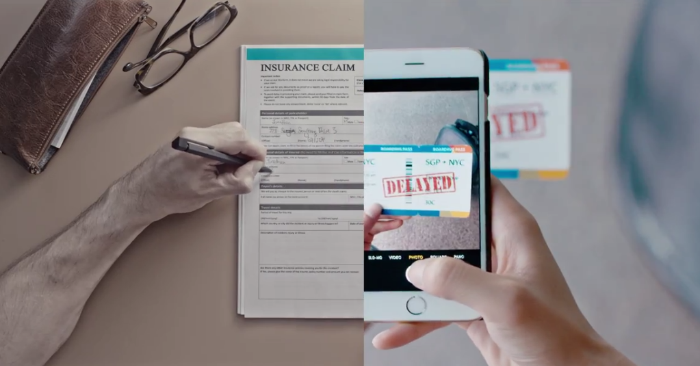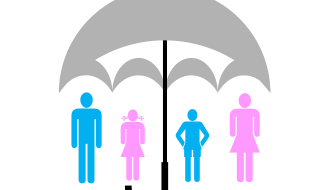- Credit cards
- View all credit cards
- Banking guide
- Loans guide
- Insurance guide
- Personal finance
- View all personal finance
- Small business
- Small business guide
- View all taxes

7 Best Cheap Travel Insurance Companies in June 2024

Sean Cudahy is a freelance reporter specializing in coverage of airlines, travel, loyalty programs and public policy. A journalist of nine years, Sean most recently served as a general assignment reporter at The Points Guy, following an eight-year run as a local television news reporter. He lives with his wife and their French Bulldog outside Raleigh, North Carolina.

Giselle M. Cancio is an editor for the travel rewards team at NerdWallet. She has traveled to over 30 states and 20 countries, redeeming points and miles for almost a decade. She has over eight years of experience in journalism and content development across many topics.
She has juggled many roles in her career: writer, editor, social media manager, producer, on-camera host, videographer and photographer. She has been published in several media outlets and was selected to report from the 2016 Summer Olympics in Rio de Janeiro.
She frequents national parks and is on her way to checking all 30 Major League Baseball parks off her list. When she's not on a plane or planning her next trip, she's crafting, reading, playing board games, watching sports or trying new recipes.
She is based in Miami.

Many or all of the products featured here are from our partners who compensate us. This influences which products we write about and where and how the product appears on a page. However, this does not influence our evaluations. Our opinions are our own. Here is a list of our partners and here's how we make money .
Finding the cheapest travel insurance is often a priority for travelers hoping to protect themselves and their finances while away from home.
But is it better to err on the side of affordable travel insurance or opt for a more comprehensive plan? That depends on your needs .
On average, a comprehensive plan that covers some combination of trip cancellation and interruption costs, medical coverage and baggage protection (and perhaps a number of other things) will cost you 5%-10% of what you paid for the trip, according to NerdWallet partner Squaremouth, a travel insurance marketplace.
That means a comprehensive policy for a trip that costs you $3,000 could run you anywhere between $150 and $300. Factors like the cost and length of your trip, the age of the travelers and how much protection you want can significantly influence what you pay for your plan.
Ultimately, Squaremouth recommends “the least expensive policy that offers the coverage [travelers] need.”
» Learn more: The best travel insurance companies right now
Factors we considered when picking cheap travel insurance plans
We considered a few factors as we looked for the most affordable travel insurance plans.
Price: If your goal is to find cheaper travel insurance, you want the price to be affordable.
Breadth of coverage: The best budget travel insurance is typically going to be a plan that offers a wide range of protections at an affordable cost, ensuring you’re protected with at least some coverage for a wide range of scenarios.
Uniqueness or customizability : While many travel insurance plans have similar protections, some stand out for particular coverage that can be helpful to certain travelers, like those needing to Cancel For Any Reason , those going on a cruise, or travelers with preexisting health conditions. We didn’t spring for the priciest plans with broad, deep coverage; instead, we picked those that meet a sort of budget "sweet spot" when it comes to cost efficiency.
» Learn more: Is travel insurance worth getting?
An overview of the best cheap travel insurance plans
We looked at travel insurance quotes for a hypothetical 10-day trip to Italy in October 2023. The traveler is a 40-year-old man living in North Carolina who spent $2,000 on the trip, including airfare.
Reliable but cheap travel insurance providers
1. axa assistance usa (silver plan: $70).

Why we picked it:
The $500 missed connection benefit is great for cruise and tour participants. It covers additional transportation, accommodations and meal costs when you miss a cruise or tour departure.
Full trip cancellation and interruption coverage, along with up to $25,000 for out-of-pocket medical costs and baggage coverage.
Among the lowest prices we found.
If you’re willing to spend a bit more than AXA's $70 Silver plan, a Gold plan only costs $19 more and gets you deeper coverage amounts and up to $35,000 in collision rental car insurance.
2. Berkshire Hathaway Travel Protection (ExactCare Value plan: $56)

Cheapest plan we found while still offering a wide array of protections.
Includes a preexisting medical condition waiver.
Add-on rental car collision coverage optional for $10 per day. You can pick how many days you want the additional coverage — it’s not all or nothing.
At $56, this plan comes in at less than 3% of the $2,000 trip cost.
3. IMG (iTravelInsured Lite plan: $77)

Treats COVID-19 like any other illness, which is to say, if your claim accepts flu, strep throat or appendicitis as an acceptable, covered condition, the coronavirus is, too.
Covers costs related to trip interruption up to 125%
Higher than normal limits on dental expenses, at $1,000. If your teeth are your Achilles heel (or your biggest fear), this plan might be for you.
The iTravelInsured Lite plan doesn’t offer some of the bells and whistles that other plans do, like rental car coverage , Cancel For Any Reason coverage or waivers for pre-existing conditions. But you’ll have relatively solid across-the-board trip protections.
4. John Hancock (Silver plan: $93 for a mid-tier plan)

Mid-level plan (as opposed to a basic plan) at an affordable price for travelers who want more coverage without paying too much.
Includes an optional Cancel For Any Reason add-on for travelers wanting flexibility. It is a bit pricey, at half the cost of the insurance ($46.50 extra for a $93 plan).
Reimburses up to $1,000 for lost baggage , far more than many basic plans.
Add-on rental car coverage for $9 per day.
At $88, John Hancock’s basic (Bronze) plan isn’t particularly affordable. But for just $4 extra, you can tap into the benefits of a mid-tier plan at still less than 5% of the total trip cost.
5. Nationwide (Essential plan: $76)

Includes a preexisting conditions waiver.
Add-on rental car coverage for $90.
Covers trip interruption at 125% of the trip cost while providing comprehensive emergency medical and baggage coverage.
6. Seven Corners (Basic plan: $75)

On top of standard trip protections, it includes a relatively affordable Cancel For Any Reason option for $31.50 extra.
If you plan to rent expensive sporting equipment, you might consider paying $10 extra to cover lost, damaged, stolen or destroyed gear.
COVID-19 coverage reimburses you for costs incurred if you have to quarantine .
Rental car coverage comes in at an affordable $7 per day.
Seven Corners’ Basic plan stands out because it offers a little bit of everything, appealing to athletic travelers, those who need affordable trip protections, those who want the flexibility to cancel for any reason and those still concerned about getting quarantined due to COVID-19.
7. Travelex Insurance Services (Basic plan: $71)

Straightforward: What you see is what you get. This plan’s coverage has fewer rules and caveats than many.
While not sporting the highest coverage amounts, it offers a solid range of protections to ensure you get at least something back when your travel is disrupted or you have a medical emergency.
Offers add-on rental car coverage for $10 per day.
At $71, the Travelex Basic plan’s cost is just over 3% of the $2,000 trip’s cost.
If you want to get travel insurance at the cheapest possible rate, here’s a trick. Put $0 as your trip cost, Stan Stanberg, co-founder of comparison site Travelinsurance.com said in an email.
“When excluding trip cancellation and trip interruption coverage the cost of a travel insurance plan goes down significantly,” Stanberg said.
That means you won’t get reimbursed if you need to cancel your trip or if it gets interrupted. But you may still have access to the plan’s medical, trip delay , missed connection, baggage and other protections.
You’ll often find comprehensive travel insurance plans cost 5%-10% of your total trip cost, according to Squaremouth. This will often get you full trip cancellation and trip protection, baggage protection, emergency medical coverage and often other benefits.
Typically, the more you pay, the broader and deeper the coverage.
For many plans, you can purchase travel insurance up until you depart. However, to get access to the most protections possible, booking two days to two weeks after making your initial deposit is the best rule of thumb.
That means you won’t get reimbursed if you need to cancel your trip or if it gets interrupted. But you may still have access to the plan’s medical,
, missed connection, baggage and other protections.
How to maximize your rewards
You want a travel credit card that prioritizes what’s important to you. Here are some of the best travel credit cards of 2024 :
Flexibility, point transfers and a large bonus: Chase Sapphire Preferred® Card
No annual fee: Bank of America® Travel Rewards credit card
Flat-rate travel rewards: Capital One Venture Rewards Credit Card
Bonus travel rewards and high-end perks: Chase Sapphire Reserve®
Luxury perks: The Platinum Card® from American Express
Business travelers: Ink Business Preferred® Credit Card

on Chase's website
1x-10x Earn 5x total points on flights and 10x total points on hotels and car rentals when you purchase travel through Chase Travel℠ immediately after the first $300 is spent on travel purchases annually. Earn 3x points on other travel and dining & 1 point per $1 spent on all other purchases.
60,000 Earn 60,000 bonus points after you spend $4,000 on purchases in the first 3 months from account opening. That's $900 toward travel when you redeem through Chase Travel℠.

1x-5x 5x on travel purchased through Chase Travel℠, 3x on dining, select streaming services and online groceries, 2x on all other travel purchases, 1x on all other purchases.
60,000 Earn 60,000 bonus points after you spend $4,000 on purchases in the first 3 months from account opening. That's $750 when you redeem through Chase Travel℠.

1x-2x Earn 2X points on Southwest® purchases. Earn 2X points on local transit and commuting, including rideshare. Earn 2X points on internet, cable, and phone services, and select streaming. Earn 1X points on all other purchases.
85,000 Earn 85,000 bonus points after spending $3,000 on purchases in the first 3 months from account opening.


Best Travel Insurance Policies for Places Prone to Natural Disasters (2024)
When it comes to natural disasters, Singapore is a sheltered island. How sheltered? Based on data from 2023, we have the 4th lowest disaster risk in the world . So on this island refuge, it can be easy for us to feel detached from earthquakes, tsunamis and cyclones.
But it’s a different reality for many of our Asian neighbours. For example, China lies where the Eurasian, Pacific, and Indian Ocean plates meet—a region with high tectonic activity. Between 1990 to 2024, Statista reports that China recorded 186 earthquakes, the highest number in the world. According to the Global Facility for Disaster Reduction and Recovery, the earthquakes that hit China account for one third of destructive continental earthquakes globally. Yikes.

If you’re travelling to earthquake-prone places like China, Japan or Bali , you want to make sure your travel insurance policy covers you in the event that your trip gets affected by natural disasters. Here’s what you need to know.
Guide to Best Travel Insurance for Countries Prone to Natural Disasters
- Best travel insurance for natural disasters
- How do I choose the best travel insurance for an area prone to natural disasters?
- What are some things that travel insurers might exclude?
- How do I make a travel insurance claim if a natural disaster strikes?
- Is it safe to travel to areas prone to natural disasters?
1. Best travel insurance for natural disasters
You won’t see a separate category for natural disaster coverage in travel insurance policies. Instead, insurers count natural disasters as one of several factors that may cause a trip cancellation, postponement, delay, or curtailment.
Let’s assume you’re going on a week-long trip to an ASEAN country. Here’s a summary of the non-discounted costs and coverage of different travel insurance policies for trip disruptions and inconveniences due to national disasters.
Back to top
2. How do I choose the best travel insurance for an area prone to natural disasters?
Before you buy your travel insurance, you need to do research on the following:
- What kinds of natural disasters that area is prone to
- How your travel insurance policy defines natural disasters
The first question to ask is what kinds of natural disasters the place you’re visiting is prone to , if any. For example, is the area near an active volcano that might lead to a volcanic eruption? Does it sit on the Pacific Ring of Fire, where 90% of the world’s earthquakes take place?
At this point, also look out for disaster warning announcements —if you’re forewarned that a natural disaster may occur but still go on the trip, you won’t be able to make insurance claims.
Additionally, don’t forget about natural disasters that you don’t hear about as often, such as hail, ice storms, landslides, heat waves, and wildfires. These are important to consider because not everyone may consider them natural disasters—including your insurers.
Once you know what natural disasters your destination area is prone to, check if your travel insurance policy defines them as natural disasters . Some insurers may limit their claims to trip disruptions due to specific disasters such as typhoons, earthquakes and tsunamis. If you have to cancel your trip due to a heat wave but your insurance policy doesn’t consider that a natural disaster, your claims won’t be approved.
For example, here’s how “natural disaster” is defined by AIG travel insurance :

Comparatively, MSIG travel insurance listed fewer types of natural disasters as examples and described natural disasters as natural events with catastrophic effects:

A good rule of thumb is to choose a travel insurance policy with a broad definition of natural disaster . Don’t assume this is always the case, especially if you’re buying travel insurance from an airline.
3. What are some things that travel insurers might exclude?
Travel insurers generally define natural disasters as any event or force of nature which has catastrophic consequences on the environment, finances or human life.
Most types of natural disasters such as earthquakes, volcanic eruptions, floods, typhoons, tsunamis, hurricanes and so on can fall under this category if they are serious enough. If you feel light tremors causing no damage, you’re unlikely to be able to make a claim.
Do note, however, that many insurers have exclusions on nuclear risks and exposure to nuclear radiation , even if this was caused by a natural disaster. For example, the Tohoku earthquake in 2011 caused the meltdown of three nuclear reactors, leading to the Fukushima nuclear disaster. Insurance would cover you for the earthquake, but may not cover you for the nuclear disaster.
The most important thing to note is that most insurers will not cover you if you already knew about the natural disaster risk in the area, but decided to book the trip or buy the travel insurance policy anyway . Insurers will usually include such announcements as travel advisories or warnings, such as this one from FWD:

So let’s say you have already read in the news that a volcano is about to erupt in a certain destination, and you go ahead and book a trip there anyway. If you end up having to cancel your trip because the volcano erupted, you are unlikely to get reimbursed for your travel expenses.
4. How do I make a travel insurance claim if a natural disaster strikes?
Recall that insurance policies don’t have a claim category for natural disasters. Instead, you’ll usually have to make a claim under one of the following:
- Travel cancellation : You are unable to depart for your trip due to unavoidable, unforeseen circumstances.
- Travel postponement : You already booked your trip, but are forced to change your travel dates and book another ticket for a later date.
- Travel delay : You end up departing for your trip at a later time than scheduled, e.g. due to a delayed flight. Insurers stipulate the exact number of hours that count as a delay—usually 6 hours. Note: Don’t mix travel (i.e. flight) delay up with baggage delay !
- Trip curtailment/shortening : You are already on your trip, and have to cut it short due to an unexpected event that happened during the trip.
Pro tip : You don’t have to pore through each travel insurance policy wording to find out these claim limits! View them easily on our MoneySmart travel insurance comparison page.
What kinds of expenses can be claimed under the categories above? Typically, a travel insurance policy should pay for additional travel and accommodation expenses incurred should your trip be disrupted due to a natural disaster in the country you’re in or travelling to.
If a natural disaster does occur while you’re travelling ( choy! ), contact your insurer as soon as possible, and preferably before incurring additional expenses like hotel bookings. They will advise you on the documentation you need to provide in order to make a claim, which might include receipts or police reports.
Finally, this has nothing to do with insurance, but it’s a good idea to call the Singapore Embassy in the country you’re in and ask for emergency contacts in case you need urgent consular assistance. You should also eRegister your overseas travel with the MFA so they can search for you if you go missing in any natural disaster ( choy! ).
5. Is it safe to travel to areas prone to natural disasters?
As we mentioned earlier, your insurance claims won’t be approved if you were forewarned about a natural disaster risk but chose to go on your trip anyway. So in this case, if you haven’t booked your tickets yet, you probably shouldn’t. But what if you’ve already booked your flight? Is it safe to go on your trip? Will you be refunded if flights are cancelled?
That was exactly what happened in October 2017, when it was announced that Mt. Agung in Bali was expected to erupt for over a month. After the last eruption in 1963 killed over 1,100 people, everyone in 2017 who booked a ticket to Bali was left wondering: Will I get killed if Mt. Agung erupts again? Should I still travel to Bali? If so, what can I do to protect my safety?
If a disaster warning surfaces after you’ve booked your tickets, here’s what you need to know:,
- It’s generally safe to travel to another area in that country far from the disaster threat. In the case of Mt Agung, there are tourist spots in Bali far away enough to not be affected by the volcano. So if you don’t have plans to travel anywhere near the Bali volcano, you can still go ahead with your travel plans. Furthermore, the authorities will clear out people in the danger zone, and will put up red alert exclusion zones where the lava and ash may potentially reach. So, if you’re ever stumbling too near the danger zone, you’ll definitely know.
- Flights will be cancelled and rescheduled by your airline. If the situation gets bad, your airline will cancel their flights to destinations near where the natural disaster is expected to occur. Flights booked that are deemed unsafe to proceed will likely be rescheduled without any additional fees. Of course, this is subjected to availability and fare differences. Alternatively, some airlines may also allow refunds.
- Airports will be closed if the natural disaster occurs nearby. In the case of Mt. Agung in Bali, the volcano erupted on 26 November 2017, leading to the closure of the Ngurah Rai International Airport because of the ash cloud. While ideally you’d be ferried to other airports in neighbouring islands to take your flight out, there’s also the chance that a widespread eruption might affect road travel and neighbouring airports too. If the eruption warning came when you were already in Bali, your insurance will cover your expenses while you’re stranded.
Have you ever experienced a natural disaster while travelling? Did you buy travel insurance ?
Related Articles
Best Travel Destinations and What To Do There, According to MoneySmart Staff
How Much Does It Cost To Travel With Pets?
10 Data Roaming Plans in Singapore—Which is Most Worth It? (2024)
6 Things to Know About Travel Insurance for Extreme Sports and Outdoor Adventure Coverage (2024)
6 Best Travel Insurance with COVID-19 Coverage in Singapore (May 2024)
- Today's news
- Reviews and deals
- Climate change
- 2024 election
- Fall allergies
- Health news
- Mental health
- Sexual health
- Family health
- So mini ways
- Unapologetically
- Buying guides
Entertainment
- How to Watch
- My Portfolio
- Latest News
- Stock Market
- Biden Economy
- Stocks: Most Actives
- Stocks: Gainers
- Stocks: Losers
- Trending Tickers
- World Indices
- US Treasury Bonds
- Top Mutual Funds
- Highest Open Interest
- Highest Implied Volatility
- Stock Comparison
- Advanced Charts
- Currency Converter
- Basic Materials
- Communication Services
- Consumer Cyclical
- Consumer Defensive
- Financial Services
- Industrials
- Real Estate
- Mutual Funds
- Credit Cards
- Balance Transfer Cards
- Cash-back Cards
- Rewards Cards
- Travel Cards
- Student Loans
- Personal Loans
- Car Insurance
- Mortgage Calculator
- Morning Brief
- Market Domination
- Market Domination Overtime
- Asking for a Trend
- Opening Bid
- Stocks in Translation
- Lead This Way
- Good Buy or Goodbye?
- Fantasy football
- Pro Pick 'Em
- College Pick 'Em
- Fantasy baseball
- Fantasy hockey
- Fantasy basketball
- Download the app
- Daily fantasy
- Scores and schedules
- GameChannel
- World Baseball Classic
- Premier League
- CONCACAF League
- Champions League
- Motorsports
- Horse racing
- Newsletters
New on Yahoo
- Privacy Dashboard
Yahoo Finance
Volatile french markets attempt to digest le pen’s reassurances.
(Bloomberg) -- French stocks gained and bonds posted small moves as traders weighed assurances from far-right leader Marine Le Pen that she’d work with President Emmanuel Macron should she prevail in national elections.
Most Read from Bloomberg
Flesh-Eating Bacteria That Can Kill in Two Days Spreads in Japan
S&P 500 Hits 30th Record of 2024 as Megacaps Rally: Markets Wrap
These Are the World’s Most Expensive Cities for Expats in 2024
Hedge Funds’ Secret Weapon to Fight the SEC Lives in Texas
How the US Mopped Up a Third of Global Capital Flows Since Covid
France’s CAC 40 benchmark advanced 0.9% as of 5:04 p.m. in Paris. The main European stock measure swung between gains and losses as Citigroup Inc. downgraded the region’s equities, citing “heightened political risks” among other reasons. Yields on French government bonds rose again on Monday, while the spread over their German peers remained broadly steady.
Concern about political volatility after Macron called a snap vote for later this month spurred a flight to haven assets last week, wiping out $258 billion from the market capitalization of the country’s stocks. On Monday, traders initially seized on Le Pen’s comments that she won’t try to push Macron out, but sentiment remains fragile before the first round of voting on June 30.
“Investors should stay out of it at the moment,” said Evelyne Gomez-Liechti, rates strategist at Mizuho International. While “there can be some short-term small consolidation,” there’s still huge uncertainty given a lack of clarity over the economic policies of Le Pen’s National Rally, she said.
Europe’s Volatility Likely to Spread to Wall Street, IG Warns
Last week’s losses saw France slip behind the UK as the biggest equity market in Europe. The slump erased all of the CAC 40 benchmark’s gains for 2024 — a sharp reversal from scaling record highs a month ago. An index of euro-denominated junk bonds — almost a fifth of which comprises French companies — widened sharply to its highest spread over benchmarks since early April.
Big Trades in French Bank Bonds Surge on Snap Election Risks
The retreat last week also spread into broader European equity markets, with the benchmark Stoxx Europe 600 Index suffering its worst week since October. The gauge traded up 0.1% after climbing as much as 0.7% earlier.
Not ‘Disorderly’
A raft of officials and strategists suggested the declines were overdone.
“What we’re seeing in the markets is, of course, a repricing,” European Central Bank Chief Economist Philip Lane said on Monday at an event organized by Reuters in London. “It’s not, you know, the world of disorderly market dynamics.”
According to Liberum’s Joachim Klement and Susana Cruz, concerns about a right-wing prime minister are overblown and markets will calm after the vote.
While a gauge of redenomination risk — the risk that France leaves the eurozone — jumped last week, it remains well below the levels seen in 2017 when then-presidential candidate Le Pen advocated leaving the European Union. The party has since softened its stance toward European Union membership.
Frédérique Carrier, head of investment strategy at RBC Wealth Management, noted that populist politicians have a history of moving closer to the center once they reach power and Le Pen’s comments had fueled hopes for that outcome in France.
Still, “foreign investors are nervous about the heightened political risk that the situation in France brings,” she said.
That nervousness is further blurring the lines in Europe’s traditional debt hierarchy, putting French bonds on a par with those once at the heart of the region’s debt crisis.
Portuguese debt now yields less than comparable French debt, while the gap between Spanish and French 10-year yields has dwindled to just 11 basis points, the least since 2008 on a closing basis.
It’s an extension of a long-term trend that’s been playing out for years, with investors increasingly demanding more compensation given the country’s bloated debt pile. The European Commission is expected to initiate its Excessive Deficit Procedure against France this week, an action designed to force member states to get poor public finances in line with EU rules.
--With assistance from Julien Ponthus, Allegra Catelli, Abhinav Ramnarayan, James Hirai and Anchalee Worrachate.
(Updates prices throughout, additional context from paragraph 10.)
Most Read from Bloomberg Businessweek
Google DeepMind Shifts From Research Lab to AI Product Factory
Online Shopping Has Become a Giant Fake Product Machine
Trump’s Planned Tariffs Would Tax US Households, Economists Warn
It Will Take More Than US Bargaining Power to Cut Drug Costs
Grieving Families Blame Panera’s Charged Lemonade for Leaving a Deadly Legacy
©2024 Bloomberg L.P.
Recommended Stories
Heard on the street: le pen or not, the ecb will ultimately prevail in france.
French stocks and bonds took a beating following he success of Marine Le Pen’s National Rally party in this month’s European elections. But investors must remember two things: + The first is that, faced with the possibility of a destructive French default, officials at the European Central Bank will always intervene.
Primo Water Stock Jumps After Announcing Merger With Poland Spring Parent
Primo Water shares jumped Monday after the bottled water company announced plans to merge with BlueTriton, which owns brands like Deer Park, Poland Springs, and Arrowhead.
Dollar Shy of Fresh 2024 High as Haven Bid, Soft Data Collide
(Bloomberg) -- The dollar has been flirting with a new 2024 high, supported by investors seeking shelter from political uncertainty in Europe even amid evidence of a slowing economy in the US. Most Read from BloombergWhat to Know About the Deadly Flesh-Eating Bacteria Spreading in Japan‘I Live in Hell’: Anti-Growth Fervor Grips US South After Pandemic BoomNvidia Becomes World’s Most Valuable Company as AI Rally Steams AheadStocks Rise as Bullish Nvidia Call Boosts AI Trade: Markets WrapI Didn’t
South African Government Partners Poised for Cabinet Battle
(Bloomberg) -- South African political parties that last week agreed to form a governing alliance after May 29 elections failed to produce an outright winner are limbering up for a tussle over cabinet positions, as President Cyril Ramaphosa prepares to be sworn in for a new term.Most Read from BloombergWhat to Know About the Deadly Flesh-Eating Bacteria Spreading in JapanStocks Struggle to Make Headway on Economic Signs: Markets WrapCiti Pitches Money-Moving ‘Crown Jewel’ as Central to RevampFle
US Equity Indexes Rise Midday After Empire State Manufacturing Index Improves More Than Expected
UBS Offers to Pay Investors 90% on Funds Hit by Greensill
(Bloomberg) -- UBS Group AG said it would give investors in Credit Suisse funds linked to the collapse of Greensill Capital a significant proportion of their money back, as the Swiss bank looks to clear through the legacy issues of its former rival. Most Read from BloombergFlesh-Eating Bacteria That Can Kill in Two Days Spreads in JapanThese Are the World’s Most Expensive Cities for Expats in 2024How the US Mopped Up a Third of Global Capital Flows Since CovidS&P 500 Hits 30th Record of 2024 as
Creditors to EchoStar’s Hughes Hire Lawyers to Probe Lease Deal
(Bloomberg) -- Some creditors to Hughes Satellite Systems Corp. engaged law firm Glenn Agre Bergman & Fuentes to scrutinize a costly lease arrangement that they say funnels cash away from the unit to its parent EchoStar, according to people familiar with the situation. Most Read from BloombergFlesh-Eating Bacteria That Can Kill in Two Days Spreads in JapanS&P 500 Hits 30th Record of 2024 as Megacaps Rally: Markets WrapThese Are the World’s Most Expensive Cities for Expats in 2024Hedge Funds’ Sec
Q&A: CEO of Siemens Grid on revolutionising grid management
Sabine Erlinghagen, CEO of Siemens Grid Software, explains how the company’s new automated grid management solution, Gridscale X, enhances grid capacity scaling, visibility of distributed energy resources (DERs) and grid flexibility.
Is Trump launching a crypto token? Industry scrutinizes 'Trump Coin'
Many industry participants regard themselves as single-issue voters, potentially making the crypto vote pivotal in the coming presidential election, some analysts say.
How hearing implants and hearables are transforming the medical devices market
According to the World Health Organization, more than 900 million people worldwide will have disabling hearing loss by 2050. For a significant proportion of those people, their condition is too severe for hearing aids to be effective, so more sophisticated medical devices are needed to enable some auditory function.
17 Insurance Products That Are A Total Waste Of Money

A factor in virtually everyone's budgetary math, insurance coverage is a crucial part of responsible financial management and emergency preparedness. There are always going to be bumps in the road, and with insurance protection, the stress of dealing with any number of potentially expensive emergencies can fall away and allow you to think clearly. Getting things back in order and returning to your routine is essential, especially for those with young children or people living paycheck to paycheck. Emergencies that create financial hardship can lead to lasting delays in planning other features of typical life. An emergency with your car or a hospital visit could see you struggling to make ends meet in the short term, and perhaps even delay big purchases farther out like a grand vacation or a new appliance that your home desperately needs.
Insurance, on the whole, is a quality means of defraying emergency expenses. However, not all insurance products offer the same layer of quality coverage. In many instances, opting for additional protections does more harm than good. For instance, veterinary care coverage for your pet often won't allow you to break even on the expenses that you pay out throughout your dog or cat's life. The coverage can ease your worry over potential future emergency care, but the financials don't tend to make sense when viewed on a wider scale. That and other insurance products often end up wasting your money. Here are some that you should likely avoid.
Rental car insurance
When renting a car, you're likely to experience an upsell from whoever you deal with at the check in desk. Adding an insurance product to a car rental reservation is a lucrative opportunity for rental car companies. These insurance products are often fairly expensive and may come with large deductible figures as well. Rental companies may even be quick to point out the astronomical deductible you may be on the hook to pay in the event of an accident without additional coverage, hoping to push concerned customers toward this added expense.
But renters are likely already covered when they drive a car off the lot. In addition to protection through your own car insurance policy, rental cars are a product that should virtually always be purchased with a credit card . This often gives you access to a lower deposit and it adds the little-known benefit of insurance coverage. Many credit card companies offer added perks, and rental car insurance is something that's commonly found among card issuers. To activate the coverage, however, you'll need to decline additional coverage products when reserving your car and completing the checking process before you take possession of the vehicle. As a result, purchasing rental car insurance is a complete waste of your money because you already have it baked in for free.
Flight insurance
Another type of insurance that acts as a redundant layer of protection for buyers and a simple money grab for the seller is the flight insurance upsell. This is a product that many airlines now offer during the checkout phase of travel booking. Utilizing the social proof concept, airlines are often quick to advertise how many people have added travel insurance to their reservations in the last day or hour. The purpose is to influence new buyers into spending a little extra money on this coverage feature. However, flight insurance is a redundancy you don't need. If your flight is canceled, the airline will have to accommodate you during any delay or refund the price of your ticket altogether. There's no need to purchase additional insurance to protect you against these kinds of delays or setbacks.
On a more somber note, in the event of a crash that injures or kills passengers, airlines are on the hook to pay out benefits to injured travelers or their beneficiaries without the need for travelers to add on any contingency coverage. Flight insurance is therefore just a way to charge you a little more for the same ticket. On another note, airline reservations are yet another product that should always be purchased with a specialized rewards credit card. Airline specific cards offer free checked bags, upgrade opportunities, and many other perks that you don't have to pay for as long as you pay with your card.

Credit life insurance (or dealership gap insurance)
Gap insurance from a car dealership or credit life insurance, as it's sometimes known, is an optional addition to lending products like mortgages and car loans. This coverage can seem like a good idea, offering to bridge the gap between the value of the asset and what you owe on it in the event of death or an inability to work. It seems particularly useful when considering the math on your car's depreciating value versus its repayment figure.
However, this insurance product is often far more expensive than the benefits it offers. Premiums are exceedingly high, especially when purchased through the dealership. To make matters worse, some lenders may incorporate this type of coverage as a requirement rather than an optional addition. Other lenders may even try to sneak it into the terms of your borrowing agreement, even though this practice is illegal. The real issue with credit life insurance and gap insurance coverage is that it doesn't benefit you or your loved ones. The beneficiary of this insurance product is the lender. In the event of the unthinkable, this insurance will kick in to pay off what you owe in whole or part rather than giving your loved ones a financial boost. Beyond the expense of monthly payments on this type of insurance, opting to incorporate additional value in a life insurance policy provides your loved ones with more flexibility and should be the preferred route.
Travel insurance (depending on coverage rules)
Travel insurance is often characterized more by what it excludes rather than what is covered. Travel insurance may seem like a great idea as you plan a fantastic holiday or quick weekend getaway with friends or family. Having this fallback allows you to really kick loose and enjoy your vacation. Travel insurance may be used to cover the expense of lost baggage, injury or health complications while away, and much more. But it's important to read the fine print on any policy you're considering purchasing before committing to it.
This is because travel insurance is often riddled with exclusions and restrictions. A cursory reading of the terms can leave you thinking you're covered for all kinds of emergency needs only to be left holding the bag if a problem does arise during your trip. Additionally, many travel insurance companies make the reporting and reimbursement process exceedingly difficult and lengthy. As a result, you may have to bear the cost upfront and then work for weeks or months after the fact to be made whole—something that many insurance purchasers expect to avoid when opting for coverage.
Whole life insurance
Whole life insurance is something of an investment rather than a pure insurance policy. The term doesn't expire, so when you die, your beneficiaries will be paid the benefit amount, regardless of whether you live to 40 or 112. Many people who are settling down and having children consider purchasing life insurance to help support their family in the event of a tragedy. Indeed, the primary use case for life insurance is typically as a safety net to replace a parent's income if they suddenly pass away. This gives families some semblance of comfort in knowing that their lifestyle isn't likely to be affected on top of the massive tragedy they've experienced. Term life insurance offers this backstop with reasonable pricing and good coverage. Unlike whole life insurance, a term policy lasts for a set number of years and might be used to cover a family for the 20 or 25 years directly following the birth of a child, for instance.
Whole life insurance can be used to augment your estate. As long as you maintain your monthly payments, your family will see the benefit when you pass. But the added cost of a whole life insurance policy can be better leveraged through retirement investments or other asset purchases. Saving the difference in monthly premiums and adding it to another investment opportunity can grow your wealth more efficiently over the long term, leaving more for your family in the long run.
Burial insurance
Experts suggest that the cost of burial insurance relative to the benefits it offers is extremely slim. Some even go as far as to suggest that burial insurance products are predatory and should be avoided at all costs. The reality is that life insurance and other savings products can be used to offset the cost of burial and offer a more efficient use of your money. Life insurance policies can include an additional benefit to cover burial costs, and act as a more valuable option on the whole than specific insurance products aimed at this need.
Alternatively, there are plenty of other ways to plan for your end-of-life expenses. For one thing, anyone who isn't particularly concerned with how they are laid to rest might consider cremation rather than a traditional burial. Traditional funerals rack up an average bill between $7,000 and $12,000 while a cremation runs between $6,000 and $7,000, on average. This choice can save your loved ones a significant amount of money. But no matter what you ultimately choose saving for this expense yourself rather than relying on an insurance product will often result in a more efficient management of one of life's inescapable features. You're simply likely to pay more by purchasing an insurance product than if you set money aside.
Any type of life insurance after you hit retirement
Life insurance acts primarily as a protection against lost income or as a means to pay off large debts that won't be discharged with the owner's death (think mortgage loans not federal student loans) . For those without a considerable debt load and have reached retirement age, new life insurance products likely won't represent a good use of your money. If you've saved diligently for retirement, you're likely to leave at least a nice portfolio of assets and cash to your loved ones after your death, added life insurance products can bolster this inheritance — perhaps dramatically — but they aren't going to provide you or your spouse much if any benefit. For those with substantial debts or limited retirement savings, a new life insurance product at this stage might be worth considering, but the premium is likely to be drastically higher in advanced age so it's worth weighing the value against the expense carefully.
Additionally, for some people who hope to leave a sizeable inheritance for their loved ones, a new life insurance product might offer a path toward this goal. But generally speaking, you may be better off continuing to invest and save rather than banking on what essentially amounts to a "cost-effective death" that takes place before you've paid a large chunk of cash into the policy. Betting against your longevity is certainly morbid, and the reality is that there are likely better ways to go about boosting your estate's value.
Life insurance policies for children
In the same way that a life insurance policy doesn't make tons of sense for someone in their older years, life insurance to cover children is equally wasteful spending. To put it bluntly, life insurance is a hedge against losing a source of income. Your children don't function as income-generating resources, and therefore a life insurance policy generally isn't useful. There are of course exceptions, and child actors and other young stars might consider this approach if they are contributing to family finances. Young ones born with chronic illnesses might also benefit from early coverage since a policy later in life may be far more expensive or entirely unavailable. But for the vast majority of individual families, there is no need to take out a life insurance policy to protect some sort of financial value in your children.
Instead, a great way to help set your children on a great financial path involves investing on their behalf. Setting money aside in a savings account or even an investment account will give them a great jumpstart on their future and might even serve as a great opportunity to teach responsible money management lessons along the way.
Identity theft insurance
Identity theft insurance purports to defend consumers against fraudulent activity taking place in their name. The idea here is to limit or eliminate liability for fraudulent spending that results from a stolen credit card or identity information. These kinds of insurance products might provide some additional assistance like coverage for lost wages or legal expenses you might incur during an identity theft resolution.
However, the reality is that resolving these kinds of financial issues doesn't typically take very long, and credit card providers are typically amicable to work with during the dispute process. Moreover, many card issuers include identity theft monitoring and coverage as a standard. The FTC notes a variety of regulations regarding the time between fraudulent charges and reporting them. However, credit card companies are often very flexible with their zero-liability policies. Generally speaking, if you've been the victim of credit card fraud, you won't realistically have to shoulder the burden that activity in your name creates. Therefore, there's little need to invest in an insurance product to cover these costs.
Collision insurance on older cars
Older cars aren't generally worth much in relation to newer models. The older your car gets the more value it loses. This phenomenon is something that everyone understands, but it isn't typically felt as a factor in day-to-day driving. The only time your car's financial value matters at all happens either when you consider trading it in or when you've been involved in an accident. Many people opt to include multiple types of car insurance coverage so that they can recover as much money as possible when the time comes to repair or replace a damaged vehicle. However, collision insurance is something that people should become less interested in adding as their car ages.
The deductible for your collision insurance is often decently high, meaning your insurance company will decline to cover some minor accidents and charge you a hefty deductible fee in order to take care of larger ones. If you find yourself driving something that isn't worth much, you may end up paying considerably more every month for your insurance coverage then you'll ultimately recover in the event of an accident. Instead, people who drive older vehicles should select the cheapest possible coverage option and then start putting away cash for a replacement or emergency repairs on their own. Rather than involving your insurance company for what ultimately won't be very beneficial and may raise your rates over the long term, prepare on your own to mitigate the damage from a potential collision.
Pet insurance
In 2011, Consumer Reports conducted a study on veterinary expenses, focusing on a 10-year-old Beagle named Roxy. The Beagle had amassed a total vet bill of $7,026 throughout her life, adding up to a substantial cost, to be sure. However, when Consumer Reports sought to price out insurance policies that would have covered all of these expenses the outlet found not a single provider who would have totaled a cost less than the actual bills themselves. Even when nearly doubling these expenses with additional, hypothetical illnesses and other veterinary requirements (taking the proposed total expenses to more than $12,000) only about half of the policies studied would have actually benefited the dog's owner.
Pet owners often worry themselves over potentially exorbitant costs to care for their dog or cat, but the reality is that taking each bill as it comes is actually the smarter move when seeking to keep costs as low as possible. Moreover, for those worried about the potentially costly emergency, it might be worth setting aside a bit of cash every month rather than paying a premium to an insurance company. While an insurance provider might decline to cover certain medical expenses, diagnostic tests, or surgeries, you can elect to approve or skip anything you want. If you price out a policy and then pay that money into your own savings account to cover emergency medical expenses you'll have far more flexibility to weather any storm that might come your way.
Extended warranty coverage
Retail stores are often quick to offer additional warranty protection for large electronics purchases and other gadgets like headphones, game consoles, and other devices. The sales pitch is typically the same, no matter where you do your shopping. Based on the purchase price you'll be offered an extended warranty plan that might last a year or more at a seemingly reasonable cost. However, most electronic devices today are sold with fairly substantial manufacturer's warranty coverage already in place. More importantly, if you're purchasing a device from a reputable brand then any potential breakage issue you might face will almost certainly occur directly after you start using the new gadget rather than a year or more down the line. It's possible to get unlucky and purchase a defective unit, but any defects present will showcase themselves virtually immediately.
The fact is that warranties from manufacturers offer more than enough protection to ensure that your gear won't break and leave you in a lurch. As well, you may also have the opportunity to take advantage of coverage from your credit card provider if you purchased the item with a card that includes this added insurance product. There's simply no need for extra insurance that comes at a cost beyond the unit's purchase price.
Dental insurance
Dental insurance seems like an important product to add to your healthcare coverage. Everyone has teeth and seeing the dentist regularly will help you keep yours looking great and feeling healthy. Regular cleanings translate into better overall health so it can seem like a no-brainer to purchase dental insurance to assist in defraying this cost.
But dental insurance coverage is notoriously stingy when it comes to payout rates and the procedures that are covered. If you need new X-rays, you may end up paying for them yourself if your policy won't cover more than one in a single year or perhaps over an even longer period. The same goes for implants, fillings, and a variety of other routine procedures involved in dental hygiene and care. Payout caps, percentage-based coverages, and a laundry list of exclusions and restrictions make dental insurance a product that often fails to pay for itself.
Home warranty coverage
A home warranty policy can seem like a great idea, especially for landlords and new homeowners who don't want to have to deal with the hassle and cost involved in fixing broken-down appliances and other routine maintenance issues in the home. However, home warranty policies often restrict your choice when it comes to selecting technicians to perform repair work at your property. This means that you'll have to select a handyman and technicians that are "in network," as it were, and this can leave you with little to no choice in the decision to select the person who will care for your home.
Perhaps more importantly, homeowners are often charged a call-out fee and when technicians arrive at the property they may ultimately decide that the problem isn't something that should be covered by the policy. In the same way that a health insurance provider might claim a preexisting condition and shirk responsibility, any number of added factors might contribute to a home warranty provider declining to pay for a repair as a result of some sort of operator error rather than a genuine defect in the appliance or item in question — whether legitimately or not.
Home and contents insurance
Home insurance policies often include protection for emergency repairs and coverage of accidental damages. You might call your insurance provider if a baseball flies through the front window or if an inattentive driver crashes through the front wall of your home. However, many people seek out home and contents insurance to cover their property and belongings in the event of inclement weather and other natural disasters.
Unfortunately, insurance providers have become exceedingly adept at shirking financial responsibility when it comes to hurricanes, flooding, tornadoes, and earthquakes, to name just a few. Natural disasters of any sort are typically excluded from regular homeowners' insurance products so if you're hoping to protect your home and its belongings against these kinds of damage you'll need to look elsewhere. Even issues like fire are often covered by their own type of insurance. Therefore, many of the issues you may be worried about in your home simply won't be covered by what might seem like a catchall policy.
Mechanical breakdown coverage
Mechanical breakdown insurance is a policy that helps you get back on the road in the event of a non-accident-related issue with your vehicle. Breakdown coverage will support you when faced with a variety of mechanical issues under the hood and throughout the vehicle. However, these insurance products often incorporate plenty of restrictions and exclusions, and insurance companies are often quick to suggest that a problem in your vehicle isn't covered by the policy for one reason or another.
These claims can become pretty inventive and drivers across the country will likely know someone whose repair work was initially or ultimately not covered by an insurance policy that seemingly should have kicked into effect. As with many other insurance products found here, you might be better served in pricing out a policy and then simply depositing that amount every month into a savings account set aside specifically to care for your vehicle.
Opting for low deductible figures
Finally, when shopping around for insurance, you may be tempted to select a policy with a low deductible figure. This means that if you call your insurance company in order to cover some sort of emergency repair work or other expense — be it a hospital bill or a burst pipe in the basement — the amount you have to pay out of pocket will be lower. A $200 deductible means that you have to pay your insurance company $200 to manage the claim and pay for the emergency, for instance. A low deductible seems like a great idea since it will reduce the amount you have to cover out of pocket in the event of a claim.
But, the lower your deductible is the more expensive your policy will be every month. Putting this into perspective, it's a good idea to think about how many times you've called your car insurance or homeowners' insurance provider in the last year, or even five. When dealing with insurance products that cover routine expenditures like health insurance for your children, a lower deductible may be worthwhile. However, for high-cost, low-usage insurance products the reality is that you'll likely save more by paying less each month than you would by reducing the out-of-pocket expense if and when you need the policy.
Recommended
- Work & Careers
- Life & Arts
Become an FT subscriber
Try unlimited access only $1 for 4 weeks.
Then $75 per month. Complete digital access to quality FT journalism on any device. Cancel anytime during your trial.
- Global news & analysis
- Expert opinion
- Special features
- FirstFT newsletter
- Videos & Podcasts
- Android & iOS app
- FT Edit app
- 10 gift articles per month
Explore more offers.
Standard digital.
- FT Digital Edition
Premium Digital
Print + premium digital, ft professional, weekend print + standard digital, weekend print + premium digital.
Essential digital access to quality FT journalism on any device. Pay a year upfront and save 20%.
- Global news & analysis
- Exclusive FT analysis
- FT App on Android & iOS
- FirstFT: the day's biggest stories
- 20+ curated newsletters
- Follow topics & set alerts with myFT
- FT Videos & Podcasts
- 20 monthly gift articles to share
- Lex: FT's flagship investment column
- 15+ Premium newsletters by leading experts
- FT Digital Edition: our digitised print edition
- Weekday Print Edition
- Videos & Podcasts
- Premium newsletters
- 10 additional gift articles per month
- FT Weekend Print delivery
- Everything in Standard Digital
- Everything in Premium Digital
Complete digital access to quality FT journalism with expert analysis from industry leaders. Pay a year upfront and save 20%.
- 10 monthly gift articles to share
- Everything in Print
- Make and share highlights
- FT Workspace
- Markets data widget
- Subscription Manager
- Workflow integrations
- Occasional readers go free
- Volume discount
Terms & Conditions apply
Explore our full range of subscriptions.
Why the ft.
See why over a million readers pay to read the Financial Times.
International Edition
John J. York opens up about 'very welcoming' return to 'General Hospital' amid cancer battle

"General Hospital " star John J. York is feeling the love from his TV family after he was forced to take a break from the show amid his battle with cancer.
York, who plays Mac Scorpio on the ABC soap opera, opened up about his emotional return to the series in an interview with "Good Morning Ameri ca " on Monday.
"Everybody has been very welcoming, very supportive," York said as he choked up. "And here I go already, right off the top 'cause I can’t tell you how nice it's been, the support that I've gotten."
York revealed in September 2023 that he was diagnosed with myelodysplastic syndrome and smoldering multiple myeloma in December 2022. The 65-year-old actor also shared with fans that he would take a "brief hiatus " from production on "General Hospital" while he underwent treatment.
Myelodysplastic syndrome consists of a "group of cancers that keep your blood (hematopoietic) stem cells from maturing into healthy blood cells," according to Cleveland Clinic. Smoldering multiple myeloma is a condition that signals someone may develop multiple myeloma, "a rare blood cancer that happens when certain white blood cells mutate into abnormal cells."
Need a break? Play the USA TODAY Daily Crossword Puzzle.
"I said, 'How long would I have if I did nothing?' " York recalled asking his doctor after receiving the diagnosis. "He said, 'Three to five years.' I was like, 'Three to five years, are you crazy? I feel fantastic!' "
Princess Kate's cancer journey: British royal makes public return for King Charles III's birthday amid cancer treatments
John. J York reflects on receiving blood stem cell transplant
For his cancer recovery, York opted for a rigorous treatment plan, which included chemotherapy and a blood stem cell transplant. The "Werewolf" actor teared up as he described the moment he learned of his transplant match.
"She said we found an exact match, and I just couldn't talk," York said. "It's just a little bag of blood and fluid, and they put it in my body. Forty minutes later, and now I'm this person."
He added: "And my cells are now fighting each other and battling each other and getting to know each other."
Linda Perry opens up about health: Singer-songwriter had double mastectomy amid secret, 'stressful' breast cancer battle
York made his debut on "General Hospital" in 1991. He received a nomination for outstanding male daytime newcomer at the Soap Opera Digest Awards in 1992, per the actor's IMDb page .
York's "General Hospital" return is expected to air Wednesday on ABC.
"I just felt so attached that I didn't feel like I missed anything," York said of his absence. "I feel like I just had a little break – a little vacation, I guess – and had to go through something, and now we’re here on kind of the other side of it."
Today’s best savings rates
Where savings rates stand today , why you should open a high-yield savings account today , weigh these factors when choosing a high-yield savings account , methodology, best savings rates today -- grow your savings faster with apys as high as 5.55%, june 18, 2024.
Now's the time to take advantage of higher APYs before the Fed drops rates.

Liliana Hall
Associate Writer
Liliana Hall is a writer for CNET Money covering banking, credit cards and mortgages. Previously, she wrote about personal credit for Bankrate and CreditCards.com. She is passionate about providing accessible content to enhance financial literacy. She graduated from the University of Texas at Austin with a bachelor's degree in journalism, and has worked in the newsrooms of KUT and the Austin Chronicle. When not working, she is probably paddle boarding, hopping on a flight or reading for her book club.
Tiffany Connors
Tiffany Wendeln Connors is a senior editor for CNET Money with a focus on credit cards. Previously, she covered personal finance topics as a writer and editor at The Penny Hoarder. She is passionate about helping people make the best money decisions for themselves and their families. She graduated from Bowling Green State University with a bachelor's degree in journalism and has been a writer and editor for publications including the New York Post, Women's Running magazine and Soap Opera Digest. When she isn't working, you can find her enjoying life in St. Petersburg, Florida, with her husband, daughter and a very needy dog.
CNET staff -- not advertisers, partners or business interests -- determine how we review the products and services we cover. If you buy through our links, we may get paid.
Key takeaways
- Today’s top high-yield savings accounts earn APYs as high as 5.55%.
- The Fed’s decision to hold rates steady at last week’s FOMC meeting means savings rates will likely remain high – for now.
- Earn more with high APYs now because once the Fed drops rates, your APYs will likely follow suit.
The Federal Reserve held interest rates steady for the seventh consecutive time at last week’s Federal Open Market Committee meeting. And for savers, that means high savings rates will likely hold on through the summer.

The best high-yield savings accounts currently earn annual percentage yields, or APYs, as high as 5.55%. But you should act soon to maximize your interest earnings because some experts expect the Fed to cut rates later in 2024 -- which means your APY will likely drop, too.
Here’s where you can find the top savings rates this week.
Experts recommend comparing rates before opening a savings account to get the best APY possible. You can enter your information below to see CNET’s partners’ rates in your area.
Here are some of the top savings account APYs available right now:
Savings rates took off in 2022 as the Fed raised the federal funds rate 11 times to fight record inflation. The Fed doesn’t directly impact savings rates, but its decisions have ripple effects. Since savings rates are variable, your APY will likely go down once the Fed drops rates. Inversely, when the Fed raises rates, banks tend to increase their APYs, too.
“When the Fed changes the rates, it impacts everything,” said Lanesha Mohip, a corporate accountant, founder of the Polished CEO and CNET expert review board member. That includes borrowing and savings rates. While taking out a loan or paying back debt may be more expensive, the high rates can also put extra money in your savings.
Last week, the Fed held rates steady for the seventh consecutive time, so APYs on savings accounts are likely to stay elevated for a while. That makes now a great time to open a savings account to maximize your earnings before the Fed begins cutting rates.
Based on CNET’s weekly tracking, here’s where rates stand compared to last week:
The average APY for the top high-yield savings accounts we track at CNET is 4.88%, but you can still find banks offering APYs over 5%. Rates haven’t budged much in the last month, but EverBank did drop the rate on its high-yield savings account on May 31 from 5.15% APY to 5.05% APY.
Smart Money Advice on the Topics That Matter to You
CNET Money brings financial insights, trends and news to your inbox every Wednesday.
By signing up, you will receive newsletters and promotional content and agree to our Terms of Use and acknowledge the data practices in our Privacy Policy . You may unsubscribe at any time.
Your new Subscription
Here’s all of the excitement headed to your inbox.
With savings rates as high as 5.55% APY, now’s the time to take advantage of competitive rates because they won’t be around forever. A high-yield savings account is a great place to park funds dedicated to your emergency fund or other short-term savings goals. Here’s what else makes HYSAs stand out:
- High rates: HYSAs often have APYs 10 times higher (or more) than the national average, as tracked by the Federal Deposit Insurance Corporation.
- Low or no fees: Monthly maintenance fees can eat into your savings. Many online banks can charge low or no fees thanks to their lower operating costs.
- Liquidity: You can access money in your HYSA anytime without penalty (as long as you mind any withdrawal limits).
- Accessibility: If you open an HYSA at an online bank, you’ll have 24/7 access through its mobile app. You may also have lots of customer service options, including by phone, online chat and secure messaging.
- Low risk: HYSAs are protected by federal deposit insurance if they’re held at an FDIC-insured bank or credit union insured by the National Credit Union Administration. That means your money is safe up to $250,000 per account holder, per account type.
Savings rates are high right now, so you’re probably eyeing accounts with attractive APYs. But don’t stop there. There are other important factors you should consider before choosing the right savings accounts for your financial goals, including the following:
- Minimum deposit requirements: Some HYSAs require a minimum amount to open an account -- typically, from $25 to $100. Others don’t require anything.
- ATM access: Not every bank offers cash deposits and withdrawals. If you need regular ATM access, check to see if your bank offers ATM fee reimbursements or a wide range of in-network ATMs, said Mohip.
- Fees: Look out for fees for monthly maintenance, withdrawals and paper statements, said Mohip. The charges can eat into your balance.
- Accessibility: If you prefer in-person assistance, look for a bank with physical branches. If you’re comfortable managing your money digitally, consider an online bank.
- Withdrawal limits: Some banks charge an excess withdrawal fee if you make more than six monthly withdrawals. If you think you may need to make more, consider a bank without this limit.
- Federal deposit insurance: Make sure your bank or credit union is either insured with the FDIC or the NCUA. This way, your money is protected up to $250,000 per account holder, per category, if there’s a bank failure.
- Customer service: Choose a bank that’s responsive and makes it easy to get help with your account if you need it. Read online customer reviews and contact the bank’s customer service to get a feel for working with the bank.
CNET reviewed savings accounts at more than 50 traditional and online banks, credit unions and financial institutions with nationwide services. Each account received a score between one (lowest) and five (highest). The savings accounts listed here are all insured up to $250,000 per person, per account category, per institution, by the FDIC or NCUA.
CNET evaluates the best savings accounts using a set of established criteria that compares annual percentage yields, monthly fees, minimum deposits or balances and access to physical branches. None of the banks on our list charge monthly maintenance fees. An account will rank higher for offering any of the following perks:
- Account bonuses
- Automated savings features
- Wealth management consulting/coaching services
- Cash deposits
- Extensive ATM networks and/or ATM rebates for out-of-network ATM use
A savings account may be rated lower if it doesn’t have an easy-to-navigate website or if it doesn’t offer helpful features like an ATM card. Accounts that impose restrictive residency requirements or fees for exceeding monthly transaction limits may also be rated lower.
Recommended Articles
Best high-yield savings accounts for june 2024, everything is negotiable, even rent. i saved $1,200 by emailing my landlord, the magic of compound interest is helping double my savings in one year, savings and cd rates won’t go much higher, experts say. here’s what that means for your money, grocery prices are skyrocketing, but i’m still finding savings. here’s what i found, how to start an emergency fund, even if you have no savings right now.
CNET editors independently choose every product and service we cover. Though we can’t review every available financial company or offer, we strive to make comprehensive, rigorous comparisons in order to highlight the best of them. For many of these products and services, we earn a commission. The compensation we receive may impact how products and links appear on our site.
Writers and editors and produce editorial content with the objective to provide accurate and unbiased information. A separate team is responsible for placing paid links and advertisements, creating a firewall between our affiliate partners and our editorial team. Our editorial team does not receive direct compensation from advertisers.
CNET Money is an advertising-supported publisher and comparison service. We’re compensated in exchange for placement of sponsored products and services, or when you click on certain links posted on our site. Therefore, this compensation may impact where and in what order affiliate links appear within advertising units. While we strive to provide a wide range of products and services, CNET Money does not include information about every financial or credit product or service.
Oops! Your browser is ancient! :( - Upgrade to a different browser or install Google Chrome Frame to experience this site.
FWD Lets You Experience Insurance Like Never Before

In its fundamental form, insurance is a contract that enables individuals or entities to receive financial protection against losses. It ensures the stability of families and businesses after a crisis or other unfortunate events. Simply put, insurance grants policyholders a peace of mind. Isn’t that what everybody wants – to be able to sleep at night without having to worry about what the future holds?
These are the reasons why I am drawn to getting insurance policies. I have to be completely honest. One of the major drawbacks that I dislike about insurance is its complexity. I am apprehensive about the piles of questions and bulky documents. Do not get me started about the confusing technical terms!
To my delight, I was introduced to a revolutionary insurance company that dances gracefully with the modern tides. This was none other than FWD Insurance . FWD Insurance aims to transform the way that Singaporeans experience insurance by simplifying the purchase and claims process. It helps you to skip the agent by directly working with them online.
Say goodbye to nerve-wracking call backs and time-consuming interrogations by embracing their user-friendly website!
FWD Insurance understands how valuable a working Singaporean’s time and money is. This is why the company maximizes these two commodities through providing insurance quotations under 60 seconds for car insurance and 10 seconds for travel insurance. These impressive figures are due to the fact that FWD only asks questions that are absolutely necessary.
For instance, it took me 25 seconds to be quoted with the premium of about S$174 for a DIRECT-Term Life insurance that seeks to cover 5 years of my life. I used the rest of my day to focus on other productive matters. You can do the same thing too!
The people behind FWD best explained the company’s concept: “We believe that insurance doesn’t need to be complex, sold through middlemen, or take up vast amounts of your time.” It offers competitive prices and easy-to-understand insurance.
Attractive Insurance Products
It is usual for people to feel skeptical when they encounter an insurance company for the first time. Wash away this feeling by knowing that you are supported by a company with a strong financial record. FWD is the insurance business arm of the established investment group, Pacific Century Group (PCG).
Choose from the four secure insurance products such as DIRECT-Term Life Insurance. Car, Travel and Personal Accident.
A. DIRECT-TERM LIFE INSURANCE
The DIRECT-Term Life insurance ensures that your family’s financial future is secured despite unfortunate events such as becoming diagnosed with a critical illness, becoming permanently disabled, or passing away.
These are the primary reasons why I am drawn to this policy:
- I can choose the period that works for my budget and lifestyle (e.g., 5 or 20 years).
- I can purchase coverage through my smartphone – without going through a middleman.
- Because FWD does not pay commission to agents, my coverage of up to S$400,000 may cost less than S$1/day.
B. CAR INSURANCE
Three comprehensive plans cover vehicle repairs, third-party damages, medical expenses, and roadside assistance. These plans were crafted to suit your personal needs and budgets.
No matter what plan you avail, your repairs will be completed by the FWD workshops. You can cruise along blissfully until your car turns ten. Furthermore, your 50% NCD is guaranteed for lifetime. NCD stands for no-claim discount. Drivers who have earned their 50% NCD get to keep it for life because they believe that one accident doesn’t make you a bad driver.
On top of that, you can add amazing features which gives you coverage when you are driving in West Malaysia and certain parts of Thailand.
C. TRAVEL INSURANCE
Take for instance; to reap the rewards of her hard work, Jena scheduled a weeklong vacation to Thailand. The beautiful country has so much to offer from pristine beaches to established sports clubs. She did not forget to pack her favorite S$200 golf putter. To enjoy a fuss-free tropical getaway, she purchased FWD’s travel insurance. It was one of the best decisions she ever made as the putter got lost in the airport and fortunately, sports equipment is covered by the policy.
Aside from sports equipment, the travel insurance also includes unlimited medical evacuation. You read that right! The last thing on your mind is how much your emergency evacuation will cost. This is why FWD has thought of this for you.
You can expect the claiming process to be a breeze too. Claim with a few clicks with the “Click to Claim” feature. This means, all you have to do is snap your boarding pass and claim for flight delays via WhatsApp. This feature is available for baggage delays too. Simply take a photo of your baggage slip and send it to FWD via WhatsApp. That is convenience at its finest!
D. PERSONAL ACCIDENT INSURANCE
Personal Accident (PA) insurance provides compensation in the event of disability, injuries or death. In fact, one feature unique to FWD is that the policy also covers the most number of infectious diseases including Zika and dengue fever. Under this policy is the Guardian Angel Benefit. If both parents pass away or become permanently disabled due to an accident, FWD will provide up to S$500,000 for the surviving children.
Lastly, natural circumstances now cannot stop you from having fun as ticketed event cancellations due to haze are covered. Apparently, they are the only insurer in Singapore to offer this.
Irresistible Features and Highlights
Before you make a commitment, it is important to know what this new insurer can do. Let me start by stating the fact that there are no middlemen or agents. Since you do not have to pay for commissions, you can save more money.
FWD allows you to complete your purchases online. It is so quick and easy to complete the online quotation that even your 9-year old niece can do it for you! As soon as you make your purchase, you will get an email with the policy. You will also receive an SMS that notifies you to check your email.
Lastly, the policies are delivered with no technical terms. You will know exactly what you will get explained in plain English.
From now till 31 January 2017, you can now enjoy a 10% discount on all FWD insurance products with this promo code – FWDHi10.
For the people behind FWD, customers are at the heart of the entire process. They let you experience exceptional insurance by minimizing your effort and making products readily accessible. May they change the way you feel about insurance!
( This article is brought to you by FWD Insurance . )

By MoneyDigest
View all articles by MoneyDigest
Related Articles
- 5 Cheapest Car Insurance Plans in Singapore - October 2, 2023
- Your Concise Guide to Insurance Terms - August 15, 2022
- How to Save Money on Healthcare in Singapore - July 15, 2022
- Consideration of Car Insurance When You Need One - March 22, 2022
- 6 Savvy Financial Tips for Young Adults - March 5, 2022
You Might Also Like

Now we can all get Honest and Instant Insurance Advice

Newbie’s Guide To Buying Insurance In Singapore

Universal Things You Must Consider When Buying Insurance In Singapore

DIYInsurance: Compare Life Insurance and Save with 30% Commission Rebates
Search the site.

IMAGES
VIDEO
COMMENTS
If you need to use it, the return on investment is high. Travel insurance protects you against the loss of prepaid, nonrefundable trip costs if you need to cancel for a reason that's covered by the policy. Those reasons can include acts of terrorism, weather events, sickness or death of travelers or their family members, loss of employment, and ...
AIG Travel Guard - Best for Add-Ons. HTH Travel Insurance - Best for Long-Term Insurance for International Travel. TravelInsurance.com - Best for Comparing Travel Insurance Quotes. Reviews of the 9 best travel insurance companies of May 2024: Allianz (Best for Business Travel), AIG (Best Add-ons) and Travelex (Best for Families).
Most people buy travel insurance to protect their baggage and belongings as it seems to be the most common mishap that could happen on a trip. Again, Allianz has outshone the rest with a $15,000 cover on personal baggage and a $10,000 cover on travel documents. However for baggage and travel delays, Etiqa Vacation Shield Plus Suite is a better ...
Travel Insurance Expert. Updated: Jun 1, 2024, 9:47am. Editorial Note: We earn a commission from partner links on Forbes Advisor. Commissions do not affect our editors' opinions or evaluations ...
Insurance. Credit & Loan. Tax & Estate Planning. Credit & Loan. May 17, 2024. Get a FREE PlayStation 5 Disc Version (worth $799) or the Dyson Airwrap (worth $859) when you apply for selected credit card from 17 May - 4 Jun 24. Credit & Loan. May 8, 2024. Get a free Apple iPad (worth $508.30), Dyson Supersonic (worth S$699) & more when you ...
Best travel insurance category. Company winner. Best overall. Berkshire Hathaway Travel Protection. Best for emergency medical coverage. Allianz Global Assistance. Best for travelers with pre ...
Travel insurance from Allianz Travel Singapore includes selected Covid-19 coverage*, plus cover for epidemics and pandemics in general (when diagnosed with a disease). The Medical and Dental cover limit is S$1,000,000 (Comprehensive Bronze and Silver) and unlimited for Comprehensive Platinum. Travel insurance in general is designed to cover you ...
Travel Insurance Outlook For 2024. Increasing trip costs and flight delays top the list of concerns for many vacationers, and these worries are likely to continue plaguing travelers in 2024.The ...
How to maximize your rewards. You want a travel credit card that prioritizes what's important to you. Here are some of the best travel credit cards of 2024: Flexibility, point transfers and a ...
It adds an average of 50% to an insurance plan's cost. And it has some special rules. You can't cancel at the last minute—you have to cancel at least 48 hours before departure in order to ...
Best travel insurance of 2024. WorldTrips: Best travel insurance. Travel Insured International: Best for emergency evacuation. TravelSafe: Best for missed connections. Aegis: Cheapest travel ...
Following the COVID-19 pandemic and associated restrictions, the travel industry is witnessing tremendous pent-up demand, with high prices to match. While the escalated prices of hotel rooms, airfare, and the like might be out of your control, there are definitely steps you can take to avoid wasting your hard-earned dollars, whether visiting ...
If you're willing to spend a bit more than AXA's $70 Silver plan, a Gold plan only costs $19 more and gets you deeper coverage amounts and up to $35,000 in collision rental car insurance. Learn ...
Money Digest is the destination for balancing life and budget - from money management tips, to cost-cutting deals, tax advice, and much more. ... One of the biggest perks of any job is health insurance. This said, how much companies actually pay largely depends on the type of plan they choose to offer. By William Fischer Read More.
Money Digest. 16,789 likes · 7 talking about this. The destination for balancing life & budget, from money management tips to cost-cutting deals.
3. Consider your trip: Where you're going and what you'll be doing there can help you decide which travel insurance to pick. If you're traveling to a nearby state for the weekend and you'll only need to hop on a train for 2 hours to get there, you probably won't need travel insurance. But if you're traveling internationally, like in ...
Sompo Travel Insurance. $800 to $1,200 for travel delay. $5,000 to $10,000 for travel cancellation. $5,000 to $10,000 for travel postponement. $5,000 to $10,000 for trip curtailment. $64 - $83/week. MSIG travel insurance. $500 to $1,500 for travel delay/flight diversion. $5,000 to $15,000 for travel cancellation.
If you purchase a basic travel insurance policy that includes trip cancellation coverage, you can expect to pay between 5% and 10% of your trip costs. For instance, if you buy a $10,000, nine-day ...
Alice Gledhill and Farah Elbahrawy. (Bloomberg) -- French stocks gained and bonds posted small moves as traders weighed assurances from far-right leader Marine Le Pen that she'd work with ...
Flight insurance. Monster Ztudio/Shutterstock. Another type of insurance that acts as a redundant layer of protection for buyers and a simple money grab for the seller is the flight insurance upsell. This is a product that many airlines now offer during the checkout phase of travel booking.
Aviva's chief executive has said that Labour's promised crackdown on rising motor insurance prices would be using a "sledgehammer to crack a nut" and was based on flawed logic. Speaking at ...
Why we chose it: We picked Nationwide as the best travel insurance for cruises because it offers travel insurance plans geared explicitly toward cruise travel.. Nationwide has three cruise insurance tiers (Universal, Choice and Luxury) that fit any budget and insurance needs. Nationwide's emergency medical coverage starts at $75,000, and all three of its plan tiers include "cancel for work ...
0:03. 0:57. "General Hospital " star John J. York is feeling the love from his TV family after he was forced to take a break from the show amid his battle with cancer. York, who plays Mac Scorpio ...
Keep this checklist handy the next time you plan for a holiday One of the easiest ways to save money on your holiday trip is leveraging on the right credit card rewards. Some cards offer you higher miles for each dollar spent on flight and hotel bookings, whereas some offer better perks for overseas spend. ... Best travel insurance: 1. AXA ...
Federal deposit insurance: Make sure your bank or credit union is either insured with the FDIC or the NCUA. This way, your money is protected up to $250,000 per account holder, per category, if ...
Enjoy peace-of-mind when you travel abroad with their complimentary insurance Welcome gift : Receive an Dyson Supersonic (worth S$699) or Dyson Micro 1.5kg Vacuum (worth S$599) or Apple iPad 10th Gen 10.9 wifi 64GB (worth S$529.00) or S$450 eCapitaVoucher
An upward trend, but more is needed. The number of adults in the United States who ate a poor diet decreased from about 49% to just over 37% between 1999 and 2020 — a drop of 11.4%, while those ...
To enjoy a fuss-free tropical getaway, she purchased FWD's travel insurance. It was one of the best decisions she ever made as the putter got lost in the airport and fortunately, sports equipment is covered by the policy. Aside from sports equipment, the travel insurance also includes unlimited medical evacuation. You read that right!